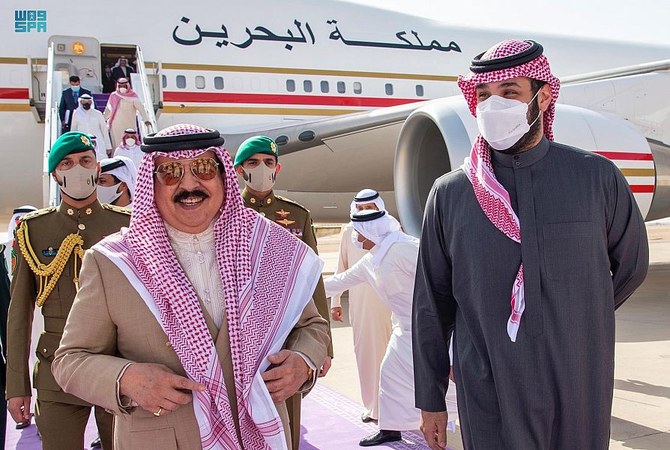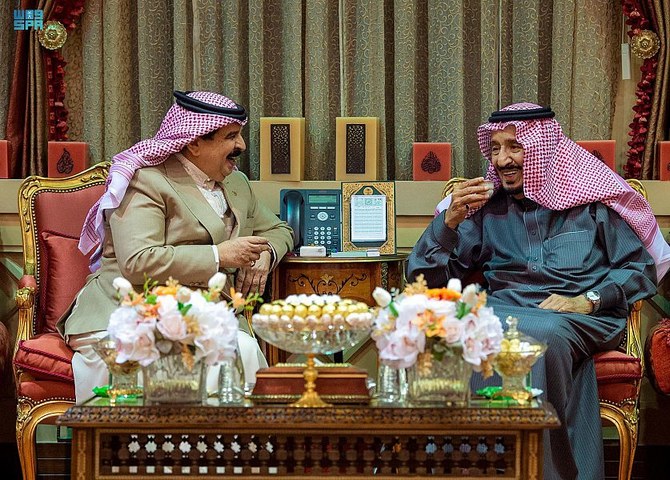



RIYADH: Saudi Arabia and Bahrain on Thursday agreed to strengthen cooperation on all political issues and to work together to develop common positions that preserve security and stability in both countries, as well as the rest of the Middle East and the wider world.
It came a day after a visit to the Kingdom by Bahrain’s King Hamad, who on Wednesday held talks with King Salman, in the presence of Crown Prince Mohammed bin Salman, about enhancing existing bilateral ties.
In a joint statement, both countries emphasized the importance of the AlUla Declaration that was signed by Gulf nations on Jan. 5, 2021, and its provisions relating to economic unity, joint defense and security systems, the coordination of positions, and the acceleration of work between Gulf states to resolve outstanding differences.
They praised the outstanding results during the second meeting of the Saudi-Bahraini Coordination Council held in Bahrain on Dec. 10 and co-chaired by Crown Prince Mohammed and his Bahraini counterpart, Prince Salman bin Hamad. As a result, a number of political, military, security, commercial, investment, cultural and tourism initiatives were launched to strengthen various aspects of cooperation.
King Salman and King Hamad issues directives for the development of military and security cooperation between their countries, and the integration of their security services to deter attempts to undermine security and stability. They highlighted the threat posed by the growing capabilities of terrorist groups in the region, and the actions of the Iranian regime in smuggling missiles and drones to such groups that target countries in the region.
The rulers praised the close cooperation between their countries on energy matters and the successful efforts of OPEC+ member nations to enhance the stability of global oil markets. They also stressed the importance of continuing this cooperation, and the need for all participating countries to abide by OPEC+ agreements.
They agreed to enhance cooperation and the exchange of expertise in the fields of oil and gas, renewable energy, nuclear energy, and artificial intelligence, in line with Saudi Arabia’s Middle East Green Initiative.
“The two sides affirmed their determination to increase joint economic cooperation by stimulating the government and private sectors, and to continue exchanging visits between business owners to reach qualitative trade and investment exchanges, and to establish economic projects in the two countries that serve the 2030 visions of the two kingdoms,” according to the joint statement.
Riyadh and Manama also stressed the importance of reaching a comprehensive and just settlement to the Palestinian-Israeli conflict that ensures the right of the Palestinian people to establish an independent state with East Jerusalem as its capital.
They agreed to continue their efforts to find a comprehensive political solution to the crisis in Yemen, rejecting any interference in the country’s internal affairs, and condemned the Houthi militia’s continued targeting of airports and other vital installations in Saudi Arabia and the UAE.
The leaders welcomed a recent UN Security Council resolution that designated the Houthis as a terrorist group, extended sanctions to all members and renewed an arms embargo. They said they appreciated the role of the King Salman Humanitarian Aid and Relief Center in efforts to alleviate the suffering of the Yemeni people.
They also expressed hopes that an Iraqi government will soon be formed “that would continue working for the security, stability and development of the country, eliminating terrorism and stopping foreign interference in its internal affairs.”
Regarding the situation in Lebanon, they affirmed their desire for its security, stability and unity, the importance of implementing comprehensive reforms to ensure that the country overcomes current crises and confines possession of arms to legitimate state institutions, and does not become a launch pad for terrorist acts and an incubator for terrorist organizations and groups that target regional security and stability, including Hezbollah.
Turning to Syria, they stressed that a political solution is the only way to resolve the crisis in the country. They backed the efforts of the UN and its special envoy to implement international resolutions, and affirmed their support for the Syrian people along with the need to support international humanitarian efforts.
The leaders said they will continue to support all efforts to achieve security and stability in Sudan, and stressed the need to reach a political solution to the Libyan crisis and for the withdrawal of all foreign mercenaries, fighters and forces from that country.
“The two sides stressed the importance of cooperation and dealing seriously and effectively with Iran’s nuclear issue, with all its components and repercussions, in a way that contributes to achieving regional and international security and stability,” according to the statement.
The two countries emphasized the need for Tehran to adhere to the principles of good neighborliness, respect for UN resolutions and international legitimacy, and to spare the region from all destabilizing activities, foremost of which is its missile program.
They also stressed the need to support security and stability in Afghanistan and not allow it to become a haven for terrorists and extremists. They condemned any activities aimed at recruiting Afghan refugees in conflict areas, and called for support of relief efforts and humanitarian work in Afghanistan.